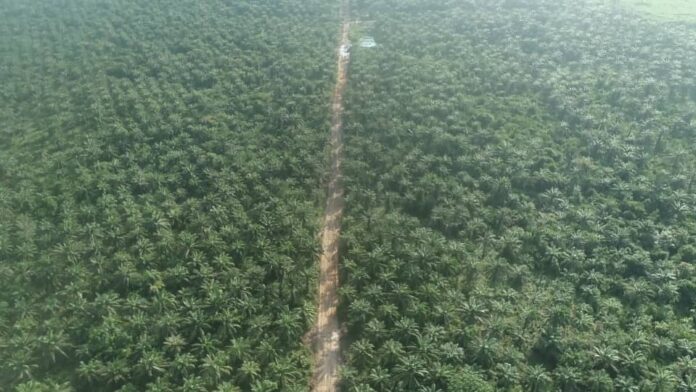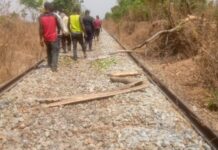Drone shot of a section of the defunct Akwa palm oil plantation being reactivated by Governor Udom Emmanuel.
By Abasifreke Effiong, Uyo
As domestic and global demand and price of palm oil jump up by 8% or US$100 (N45,000) per metric ton, Akwa Ibom state government has commenced the reactivation of Nigeria’s foremost palm plantation – Akwa palm.
Akwa Ibom State Governor, Mr. Udom Emmanuel, has ordered the reactivation of Akwa palm, a-3000 hectare plantation, 22 years after a military administration in the State shut down the farm.
Reactivation of Akwa palm industries limited is part of the government’s strategic agricultural investment and industrial programme.
Akwa palm contributed an estimated 34% percent of Nigeria’s crude palm oil (CPO) export in the 1970s and 80s when the country was the largest exporter of CPO and palm kernel.
The company, a public private partnership with Akwa Ibom State having about 20% equity, was operating optimally until Navy Captain Joseph Adeusi, military administrator of Akwa Ibom State from 1996 -1998, sacked its Board arbitrarily.
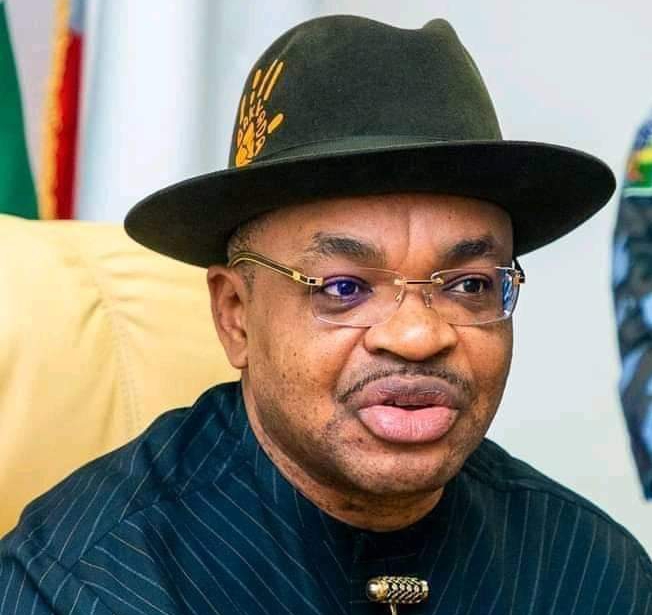 Akwa Ibom State Governor, Mr. Udom Emmanuel.
Akwa Ibom State Governor, Mr. Udom Emmanuel.
Akwa palm plantation has 200,000 stands of palm trees and a-300,000 capacity palm seedling nursery. Palm seedlings from the plantation fed many African countries including Malaysia and Cote d’Ivoire who are now the 2nd and 9th largest global exporter of crude palm oil and palm kernel as well as their extractive products.
Nigeria’s local production has dropped as well as her contribution to global palm oil export. The country is currently ranked 28th on the global export of palm produce at a time palm oil is most sought after globally.
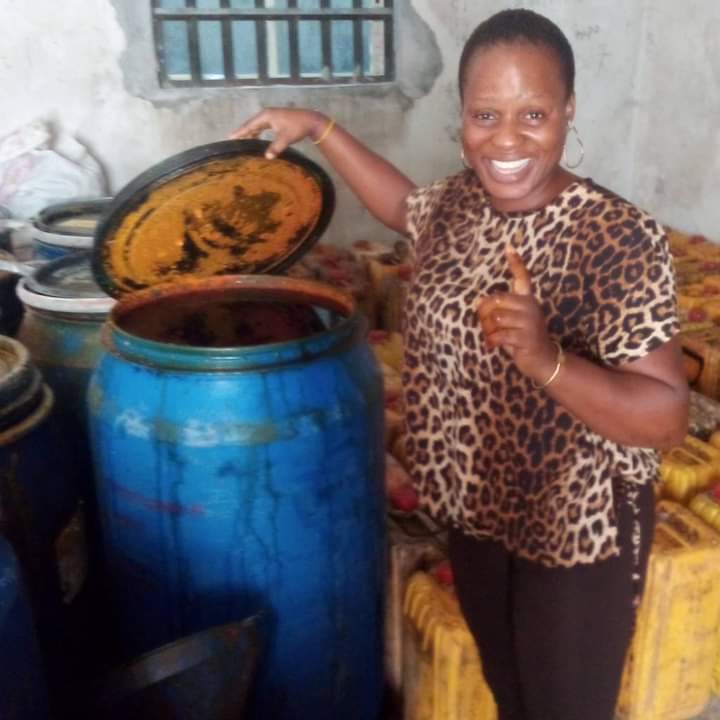
Ms. Helen John, CEO of Helencrest Resources, an Akwa Ibom based company dealing on buying, storage and supply of crude palm oil (CPO) across Nigeria, posing in her store in Ikot Ekpene. (Credit : Facebook).
On Friday, July 16, the average price of a tonne of crude palm oil (CPO) reached a decade high price of $1,241 (US dollars). The Solvent Extractors Association of India (SEA), reported early this month that palm oil prices increased by US$100.
The US stock, Indian Express and The Jarkata Post also reported this month that the global and domestic prices of crude (edible) palm oil, derivative from CPO and products derived from palm kernel oil have jumped by 8%, and still remain high.
Increase and additional demand for palm oil and palm products has grown globally after the COVID-19 restrictions due to depleted stock across Asia, and increasing number of COVID-19 cases in Malaysia and Indonesia have heightened concerns regarding palm production being affected by paucity of labour. Also, dry and hot weather in Canada, Argentina, Brazil and the US is affecting soyabeans crops (alternative to palm oil).
READ : PPDC tells Akwa Ibom govt to complete 29 years old hospital project in Nsit Atai
Currently, Nigeria is experiencing the usual, seasonal shortfall in palm oil production. Heavy rainfall between late March and August in Southern Nigeria affect ripening of palm fruits.consequently, the supply of edible oil during the rainy season is minimal and largely dependent on stock kept during other months and import.
As of last week, 30 litres of edible palm oil was sold for N18,000 in local markets in Akwa Ibom State where Akwa palm plantation is located. A liter of oil was sold for N600 at wholesale price, that is, N517 higher than the price for the same quantity in Malaysia, India, and Indonesia which was ₹10-15 (Indian Rupees).
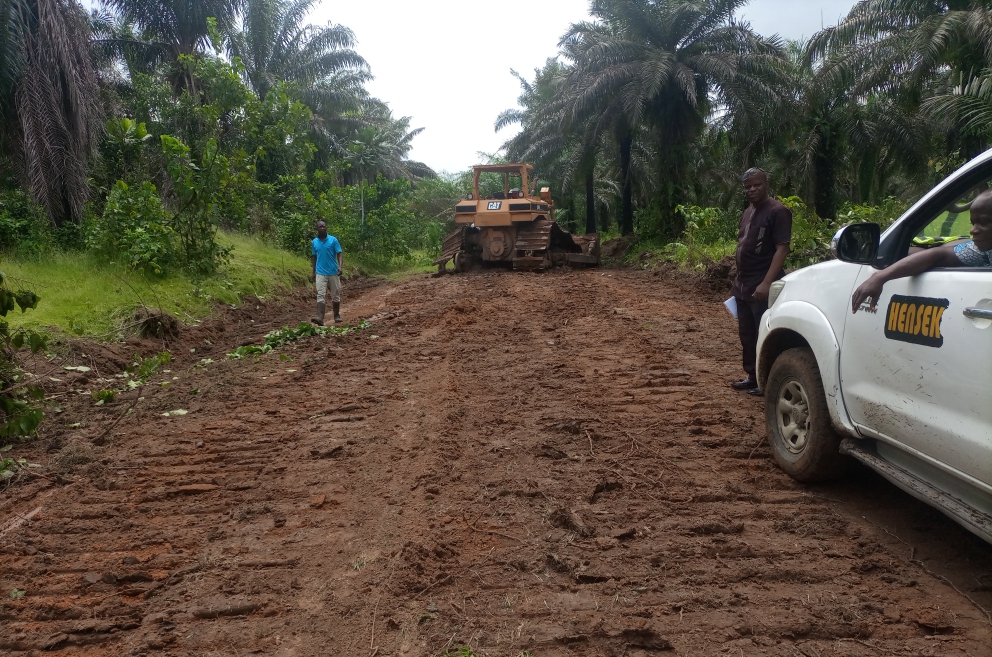 A tractor working inside Akwa palm oil plantation. (Credit : Abasifreke Effiong – The Dune).
A tractor working inside Akwa palm oil plantation. (Credit : Abasifreke Effiong – The Dune).
Akwa palm plantation established in 1962 by the government of then South Eastern State alongside Abia palm and Oguma oil palm, Benin, Edo State, sits within three local government areas (Esit Eket, Mbo and Uruefong Oruko) in the southern part of Akwa Ibom State.
A former Director at the company said the plantation had the finest variety of Tenera specie of palm fruits sought after by F&B, pharmaceutical, agro-feeds, cosmetics and industrial ink companies.
“The plantation had a direct employment capacity of 500 workers. Part of the proceeds from Akwa Palm went into the building of the famous University of Nigeria, Nsukka”, the former Director said.
Complementary to the plantation, Akwa palm had a mill that processed 15 tonnes of fresh fruit bunch (FFB) per hour, staff quarters and a 300,000 seedlings nursery which serviced many countries in West African region particularly, Malaysia and Cote d’Ivoire.
“Buyers of palm seedlings used to come from Cote d’Ivoire to buy seedlings here because we had the best variety”, a former staff of Akwa palm said.
During a visit to the plantation last week to see how far the state government has gone with the reactivation of the plantation, this reporter observed that the mill at the plantation had been vandalised. The staff quarters is dilapidated.
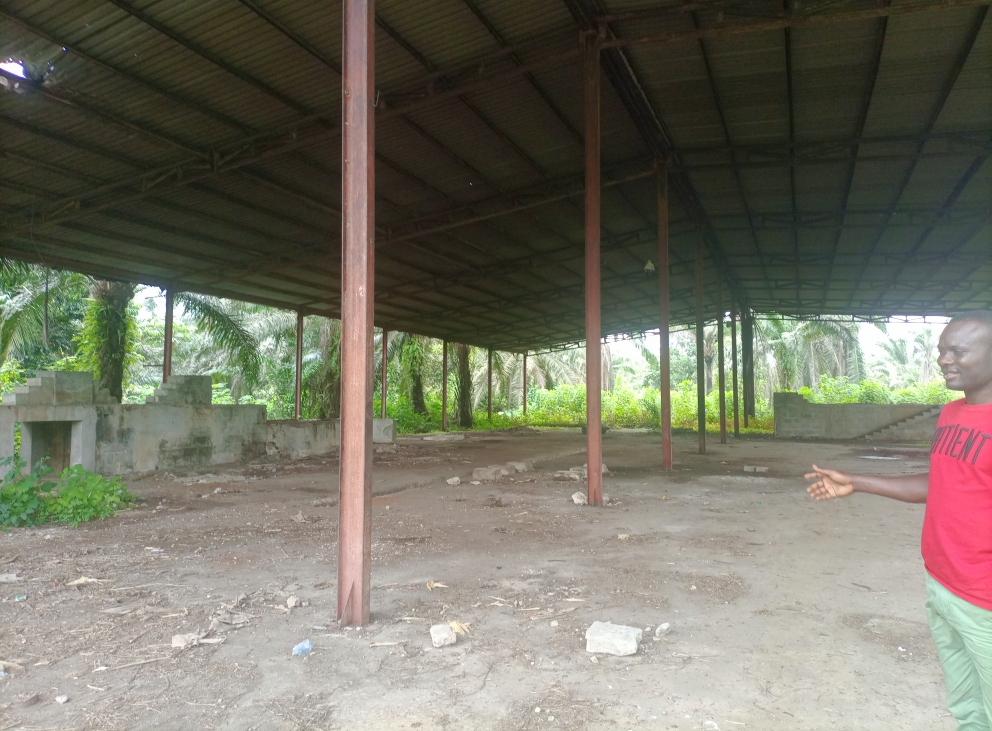 The vandalised palm oil mill at Akwa palm plantation. (Credit : Abasifreke Effiong – The Dune.)
The vandalised palm oil mill at Akwa palm plantation. (Credit : Abasifreke Effiong – The Dune.)
Akwa Ibom people are excited about the prospects of the revitalization of Akwa palm. In fact, during the 2019 governorship campaigns in the State, the reactivation of Akwa palm was the only major campaign point which was contained in the manifesto of both Governor Udom Emmanuel and his lead opponent, Obong Nsima Ekere.
Two years after the 2019 election, the Udom Emmanuel administration has completed a baseline study of the plantation; has graded 16 roads within the farm and is making plans to bring in 500,000 Tenera seedlings to replace old palm trees in the farm.
READ ALSO : Governor Masari lauds Nigerian Air Force’s response to banditry
The Director of Agricultural Investment in the State, Pastor Umo Eno, whose office is in-charge of the reactivation of the palm plantation said the state government is hoping to tap into the CBN oil palm initiative to get the plantation working again.
Pastor Eno who is also the Commissioner for Lands and Water Resources, said the government has set up a company, Dákkàdà Oil Palm Limited, to oversee the reactivation of the plantation.
“I inherited Akwa Palm as moribund. There is so much laying down there. So, part of the things we did in agric investment was to see how we can resuscitate some of the moribund agric investments.”
“We have been talking to CBN, they have agreed to give us a loan of N10 billion, but the government has to show good faith by getting this place up and running.”
“In the next 6 months, we would have completed the opening of the roads, building of administrative office, and setting up the nursery. NIFOR will give us seedlings that will yield fruits in 3 years. What we have there still has 3 years lifespan, so we can’t cut down those trees. We have to prune them and get a mill ready. We are going to bring in 500,000 Tenera oil palm seedlings. Akwa palm will need 200,000, while the remaining 300,000 will be for our out-growers’ palm seedling and planting programme.”
“Right now I am communicating with a company in Portugal, they can give us a mill within a year so that it will come with tank farms so you produce and store the oil and then you can distill.”
READ MORE : Ease of doing business: Governor Emmanuel has decentralized issuance of C of O – Lands Commissioner
The Commissioner said companies have already indicated interest to buy derivative from CPO, and palm kernel oil (PKO) from the State.
“We already have letters of intent from major companies about palm oil from within the country. Cadbury had said they will buy from us, and PZ, too.”
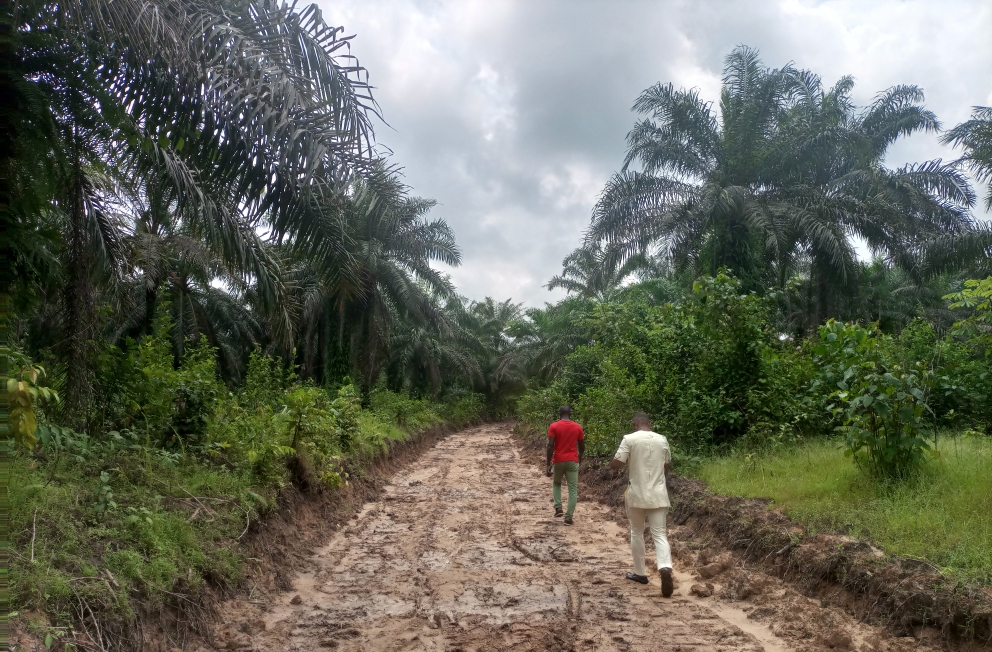 One of the roads opened in Akwa palm oil plantation.
One of the roads opened in Akwa palm oil plantation.
Reactivation of palm plantation is yet another futuristic project of the Udom Emmanuel administration which has enormous buy-in from Akwa Ibom people.
The youth leader of Esit Eket, one of the plantation’s host communities, Mr. Mfon Idorenyin Etang, said they are optimistic and excited about the commencement of reactivation of the palm plantation.
Etang said though the host communities have enjoyed proceeds from the sales of fresh fruits bunches during the past 22 years when the plantation was abandoned, they are totally in support of the take over by government.
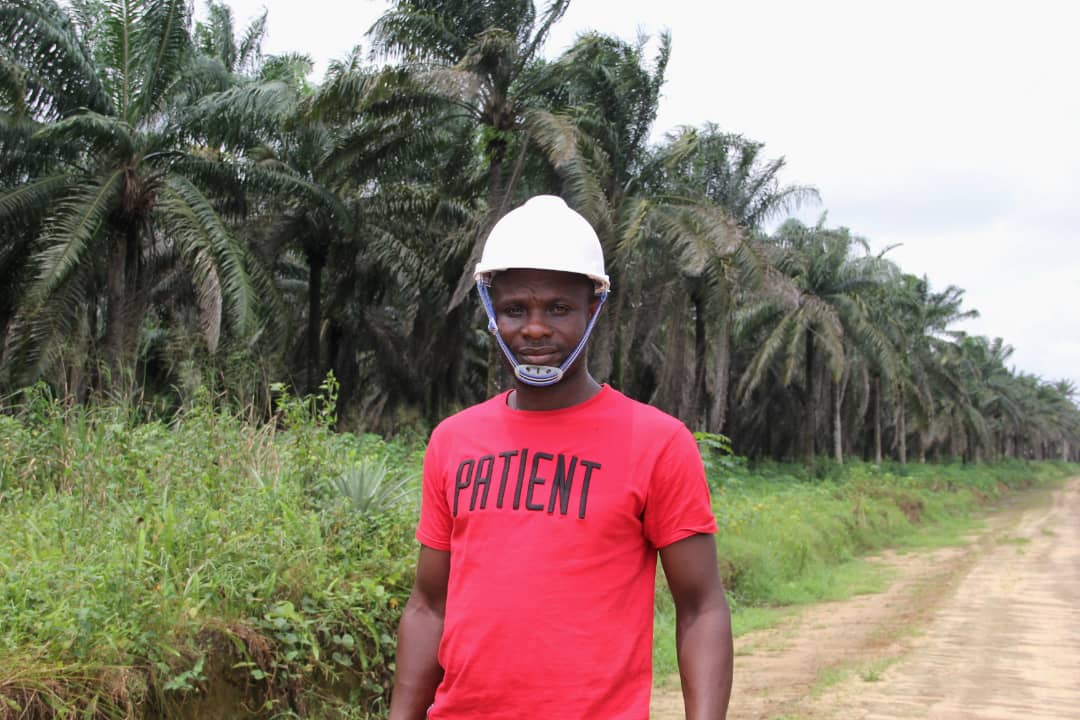 Mr. Mfon Idorenyin Etang, youth leader of Etebi Idung Assang, Esit Eket local government area, one of the host communities of Akwa palm oil plantation.
Mr. Mfon Idorenyin Etang, youth leader of Etebi Idung Assang, Esit Eket local government area, one of the host communities of Akwa palm oil plantation.
“The government met with us and told us that they will soon take over the plantation. We agreed. We support it. For now the government has not taken over the farm from us, we are still harvesting palm fruits. But they have opened up the roads.”
“The government said they will do prunning of the palm trees, they will build a mill. I and other youths have been engaged to provide security for the company staff grading the roads in the farm.”
“We are happy because a lot of jobs would be created and businesses will pick up in the three local government areas hosting this palm plantation when it is fully reactivated”, Etang said.



